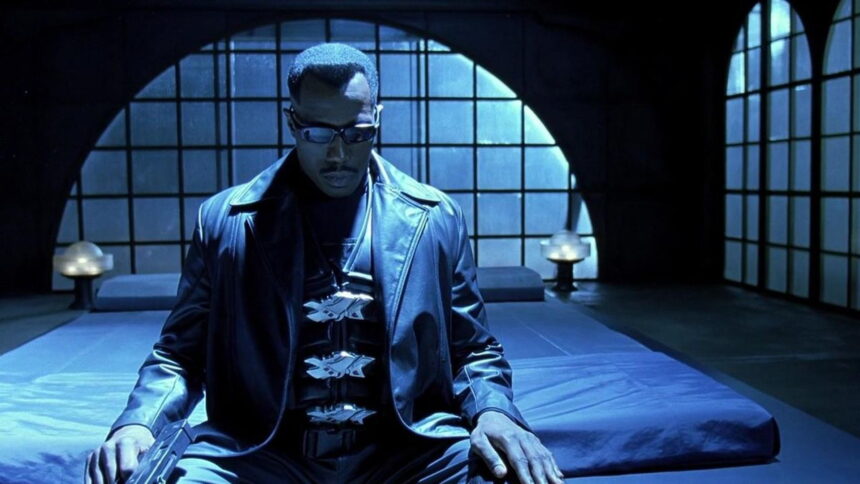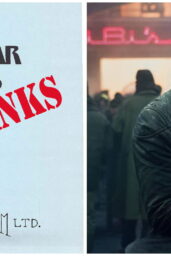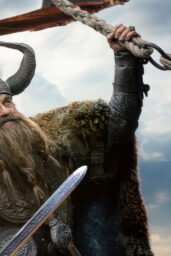Nothing prepared fans for this version of Blade
Let's get something straight: Marvel doesn't usually miss. But sometimes, it hesitates—and those pauses leave behind what-ifs that haunt fandom like ghost stories. Case in point: the Blade reboot that never was. Imagine a 1920s vampire noir, starring Mahershala Ali, scored by experimental music artist Flying Lotus. Bold. Retro. Bloody poetic.
Yet here we are, nearly six years after that electric 2019 Comic-Con announcement, and Blade hasn't seen the light of day—or moonlight, for that matter. We're still clinging to Ali's eerie voice cameo in Eternals as the only “appearance” of the daywalker in the MCU.
But a recent interview just cracked open a vault of cinematic treasure that might never be.
“It was a 1920s Blade story”—and we missed it
In a revealing podcast sit-down with Robert Meyer Burnett, Oscar-winning costume designer Ruth E. Carter dropped the bomb: she was in full prep mode for a Blade film set in the roaring ‘20s. Think jazz-age grit, speakeasies, and vampire syndicates stalking smoky back alleys.
Carter, fresh off Black Panther and newly teamed with director Ryan Coogler again for Sinners (another period vampire piece), detailed how she was deep in 1920s research before the dual writers' and actors' strikes killed the project mid-birth.
And what's worse? She wasn't the only talent orbiting this project. Flying Lotus, the avant-garde beat sorcerer who recently directed Ash, tweeted his heartbreak:
“Yeah I was signed on to write music for the new Blade movie before it fell thru… would have been fun tho.”
This wasn't just another Marvel assembly-line feature. This was an idea. An audacious one.
Could this have been Marvel's Joker moment?
Here's the uncomfortable truth: Marvel's formula is starting to taste familiar. Predictable, even. But this 1920s take on Blade? It smelled of risk and originality. Like Warner Bros. letting Todd Phillips go full anarchist with Joker or letting Matt Reeves make a Batman film that's more Zodiac Killer than comic book.
What Marvel might have had was their own Sin City. A stylized blood opera with silent-film shadows and Flying Lotus' dissonant, cosmic horror beats rumbling beneath the surface. Honestly, that doesn't just sound cool. It sounds necessary.
Especially for a character like Blade.
Blade is Marvel's most punk-rock property. Why play it safe?
Wesley Snipes' Blade was the proto-MCU. It dropped in 1998 and walked so Iron Man could fly. But it was dirty, adult, and violent in a way Marvel rarely dares to go. Rebooting that with Ali—a two-time Oscar winner with a quiet intensity perfect for brooding anti-heroes—already had gravity.
But pushing that into a historical period piece? That's adding mood, mystery, and world-building opportunities galore. Picture this: Blade as a Harlem Renaissance myth. Jazz music hiding vampire codes. Vampires laundering money through bootlegging operations. Come on, that's cinema.
But the reboot is caught in Marvel's development hell
So what happened? Development gridlock. Rumors suggest Ali is “increasingly frustrated,” while previously attached stars like Delroy Lindo and Aaron Pierre were reportedly written out. Writers came and went—Stacy Osei-Kuffour, Nic Pizzolatto, Beau DeMayo, Michael Green, and Eric Pearson. That's not a writing team; that's a screenwriting graveyard.
All the while, other MCU films have flown past: sequels, spin-offs, multiverses. Meanwhile, Blade fans are still chewing on Ali's one-line whisper in Eternals.
Flying Lotus' heartbreak is our cultural loss
Here's the thing: Flying Lotus doesn't do safe. His work on Kuso and now Ash leans experimental, disturbing, even beautiful in its chaos. His musical instincts bend genres and break ears—just what a vampire film needs to feel unpredictable again.
Let's be real. Hans Zimmer is great, but you already know what a Zimmer vampire soundtrack would sound like. Flying Lotus, though? It could have sounded like nothing we've heard before.
Now, that uniqueness is on indefinite pause—maybe forever.
Industry déjà vu: Promising visions abandoned
If this feels familiar, that's because it is. Studios love to announce daring projects only to axe them when the going gets tough. Remember Guillermo del Toro's Justice League Dark? Ava DuVernay's New Gods? Or David Ayer's original Suicide Squad cut?
It's a brutal cycle: bold ideas greenlit, then ghosted. Hollywood has a fear of commitment when it comes to originality—especially if it's wrapped in a franchise cloak. Marvel, for all its strengths, isn't immune.
Blade deserved this moment. We deserved this Blade.
The saddest part? This might have been the version of Blade that finally made the character iconic again. Not just another cog in Marvel's machinery, but a cultural event. An art house blockbuster. The kind of thing critics fawn over and fans obsess about for decades.
Instead, we got… silence. Delays. Rumors. And now a period-piece Blade might just live in the land of lost dreams, alongside Donald Glover's Deadpool animated series and George Miller's Justice League: Mortal.
Would you risk it? Would Marvel?
Now the question is: Will Marvel ever circle back to this version? Or will we one day see Blade rebooted in a safer, modern-day setting, with a boilerplate score and generic fight choreography?
Would you risk the backlash to try something this weird, this poetic, this different?
Let us know in the comments. Or just light a candle for the Blade that might've been.










